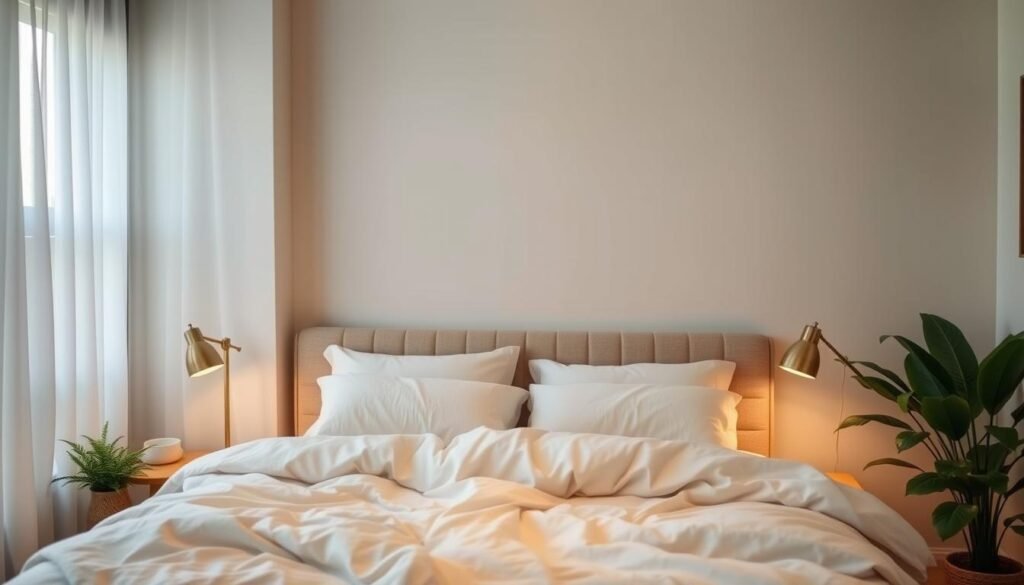About 35% of U.S. adults say they don’t sleep enough. Interrupted sleep is common today. It harms our health and happiness. Short and disturbed sleep hurts our brain function and emotions.
But all is not lost! If you understand what interrupts your sleep, you can fix it. Focusing on the reasons and practical ways to solve them helps. This way, you can enjoy the deep, refreshing sleep your body needs.
Conditions like insomnia and sleep anxiety often occur together. They make sleeping well hard. But, there’s hope. By creating a calming routine before bed, improving your bedroom, and living healthier, you can sleep better. These actions lead to better sleep, which boosts your mind and body health.
Key Takeaways
- Interrupted sleep affects both physical and mental health.
- Addressing sleep disruptions is crucial for improving sleep quality.
- Creating a sleep-friendly environment can enhance overall sleep experience.
- Regular exercise and a balanced diet play key roles in managing sleep quality.
- Implementing relaxation techniques can significantly reduce sleep anxiety.
- Maintaining a consistent sleep schedule supports a healthier sleep pattern.
Understanding Interrupted Sleep
Interrupted sleep means waking up many times at night. About 36% of adults wake up three or more times every week. This makes it hard to feel refreshed in the morning and affects how well we think during the day.
People who often wake up at night feel their sleep isn’t good. On the other hand, those who don’t wake up feel rested. Lack of continuous sleep can shorten total sleep time. This is a problem since adults need seven to nine hours of sleep each night.
Many things can cause sleep to be broken. Stress, chronic pain, and certain lifestyle choices are common causes. For example, 88% of people with chronic pain have trouble sleeping. Also, 75-85% of women going through menopause face hot flashes that make sleeping hard.
Older adults may find their sleep patterns change, like waking up early or having trouble staying asleep. Drinking caffeine late in the day also can disrupt sleep. Writing down your thoughts before bed might help relax your mind for better sleep.
It’s important to know that sleep problems can be linked to health issues, like GERD and sleep apnea. These conditions make interrupted sleep worse. Talking to a doctor about ongoing sleep issues is key. They can help find the cause and improve your sleep and overall health.
Symptoms of Interrupted Sleep
Interrupted sleep can show in many ways that greatly affect daily life and health. A common sign is waking up a lot at night and then having trouble sleeping again. This can lead to restless sleep, making people feel tired and unfocused all day.
Being sleepy during the day is another common problem. It can hurt your focus and lower your work performance. About 35% of American adults say they don’t sleep well, showing many struggle with sleep problems. Knowing the signs of these problems is key for managing Insomnia effectively.
Other symptoms may include:
- Difficulty falling asleep at night
- Frequent awakenings that disrupt sleep cycles
- Increased irritability or mood changes
- Memory and cognitive function issues
It’s important to understand these signs because they could hint at sleep disorders like Insomnia. These issues may come from many sources, including genetics and mental health issues. Knowing and treating these signs is a step towards better sleep and overall health.
Why Sleep Disruptions Matter
Sleep disruptions matter because they hurt our Sleep Quality. This is key to staying healthy. Not getting enough sleep can lead to heart disease, diabetes, and even problems with thinking. When sleep is often broken, it can make us moody, anxious, and depressed. Knowing why disruptions in sleep are bad is key to realizing we need regular sleep.
Adults need 7 to 9 hours of good sleep each night to be their healthiest. Kids and teens need more sleep because they are growing. If we don’t sleep enough, it’s hard to fall asleep, stay asleep, and we might feel grumpy and unfocused during the day.
Studies show that messed up sleep cycles, like from working nights or traveling, can seriously affect our health. It messes with our bodies, minds, and how we behave. If you have ongoing sleep problems, making a sleep schedule can really help your Sleep Quality and lower health risks. Talking to doctors can also give us more ways to handle these sleep issues.
| Impact of Sleep Disruptions | Possible Effects |
|---|---|
| Insufficient Sleep | Increased risk of heart disease, diabetes |
| Cognitive Decline | Difficulty concentrating, memory loss |
| Mood Disorders | Anxiety, depression |
| Poor Sleep Habits | Difficulty falling asleep, waking frequently |
Causes of Interrupted Sleep
It’s key to know the causes of sleep disruptions to fix the root problems. Several things can mess up sleep patterns. Changes in our bodies as we age play a huge part, making older people struggle more. This struggle can be because of health issues, problems with brain function, or mental health challenges. Neurodegenerative diseases like Alzheimer’s can mess with sleep too, causing people to sleep at odd times instead of a solid 7 to 8 hours at night.
How we live our lives greatly affects how well we sleep. If our sleep schedule is all over the place, it can throw off our body’s clock. Bad habits, like eating too much late or drinking caffeine, can make it hard to fall asleep. And if you’re really stressed, it could lead to not sleeping well for a long time since your mind plays a big part in sleep.
Health issues can also keep us awake at night. Things like constant pain, trouble breathing, or feeling really down can make it hard to rest. Some medicines might mess with sleep too, which shows why talking to a doctor is important. Stress and worry can make these problems even worse, leading to nights filled with tossing and turning. By understanding these causes of sleep disruptions, we can start to make changes for better sleep.

Dealing with Interrupted Sleep
Finding the main causes of interrupted sleep is key. These can come from too much screen time, a lot of stress, or how you eat. Knowing what triggers your sleep issues is the first step towards fixing them.
Identifying Key Triggers
Those who often wake up at night should watch their daily habits for clues. You might notice certain actions lead to poor sleep, such as:
- High consumption of caffeine, especially in the afternoon or evening
- Inconsistent sleep schedules
- Engaging in stimulating activities close to bedtime
- Environmental factors like noise and light
Spotting these triggers early can help make sleep better. For a more detailed plan, you might find it helpful to look at NHS’s insomnia guidelines.
Understanding the Role of Stress
Stress is a big factor in Sleep Anxiety. It can stop you from getting to sleep or staying asleep. Stress and sleep troubles feed off each other, creating a difficult cycle. Trying things like writing in a journal or doing yoga can reduce stress. These approaches are proven to help you sleep better.
If sleep issues because of stress don’t go away, getting help is important. Cognitive behavioral therapy for insomnia (CBT-I) offers methods to handle sleep problems. It also deals with the stress that adds to the trouble.
Creating a Sleep-Friendly Environment
A good atmosphere is key for quality sleep. Creating a Sleep-Friendly Environment requires a few steps, starting with bedroom comfort. It’s important to choose the right mattress and pillows for better sleep. Good bedding that fits personal needs can reduce discomfort at night. This makes the bedroom more cozy, helping you avoid waking up too much.
Optimizing Bedroom Comfort
To make your bedroom more comfortable, here are some tips:
- Select a mattress that suits personal sleeping habits and preferences.
- Invest in pillows that provide proper neck and head support.
- Choose breathable bedding materials to maintain a comfortable temperature.
- Keep the bedroom clean and free of clutter to create a calming atmosphere.
Minimizing Noise and Light Disruptions
Noise and light from outside can mess with your sleep. To create a restful space, it’s good to limit these disturbances. Here’s how:
- Use blackout curtains to block outside light and enhance darkness.
- Incorporate calming scents, like lavender, which can promote relaxation.
- Utilize white noise machines or fans to drown out background sounds.
- Keep electronic devices away from the bedroom to limit distractions.

By addressing these areas, you can greatly improve your Sleep-Friendly Environment. This leads to better, more uninterrupted sleep, and fewer Night Awakenings.
The Importance of Sleep Hygiene
Getting good sleep is crucial for better health. But over one-third of American adults don’t sleep enough. Following good Sleep Hygiene Tips will greatly improve your sleep. Having a regular Consistent Sleep Schedule helps your body clock. It makes sleep more refreshing and regular.
Setting Consistent Sleep Schedules
Keeping a Consistent Sleep Schedule is key for sound sleep. Sleeping and waking up at the same time every day helps your body’s rhythms. This method leads to better sleep quality. Adults need at least 7 hours of sleep. Older adults should get 7 to 9 hours.
Practicing Pre-Sleep Rituals
Pre-Sleep Rituals are great for getting ready to sleep. Doing things like reading, gentle stretching, or meditation helps you relax. These activities tell your brain it’s time to rest. Also, turn off electronics 60 minutes before bed. This reduces blue light exposure, aiding in sleep.
Relaxation Techniques for Better Sleep
Learning effective relaxation techniques can greatly improve sleep quality for those struggling with insomnia. Techniques like deep breathing and progressive muscle relaxation help reduce physical tension and bring calmness, necessary for a good night’s rest. Mindfulness meditation is also a key method to quiet the mind and reduce stress. We will look at different ways to get better sleep.
Deep Breathing and Progressive Muscle Relaxation
Deep breathing exercises promote mindfulness and are great for reducing stress. Follow these steps to enhance your relaxation:
- Find a comfortable position, either sitting or lying down.
- Close your eyes and take a deep breath in through your nose, letting your abdomen expand.
- Exhale slowly through your mouth, letting go of tension with each out-breath.
Progressive muscle relaxation means tensing and then relaxing different muscle groups. It helps you become aware of how your body feels, which brings calmness and helps you sleep. By doing these relaxation techniques often, you can improve your sleep quality.
Incorporating Mindfulness Meditation
Mindfulness meditation is known for improving mental health and sleep. It teaches you to be aware of the present moment and watch your thoughts without judgment. Here’s what you typically do in a meditation session:
- Find a quiet place and sit comfortably.
- Focus on your breath and notice when thoughts come up.
- Gently return your focus to your breath whenever your mind wanders.
Studies find that mindfulness meditation lowers anxiety and helps you sleep better. Tools like meditation apps can help beginners. Making meditation a nightly habit can lead to deeper sleep.
To learn more about how relaxation techniques can relieve stress and improve sleep, check out these resources. By consistently using these techniques, you can work towards better sleep.
Improving Sleep Quality through Healthy Habits
Creating healthy habits is key for better sleep quality. Regular exercise keeps you fit and lowers anxiety, helping you sleep better. By staying active, you boost serotonin and melatonin, which help control your sleep cycles.
Regular Exercise Benefits
Adding daily exercise improves wellness and sleep. A 2021 review shows active people enjoy better sleep. Here’s how exercise helps:
- Stress Reduction: Exercise releases endorphins, reducing stress.
- Daytime Alertness: It helps you stay alert during the day, ensuring deep sleep at night.
- Optimal Sleep Duration: Moderate workouts could extend your sleep time.
Balanced Diet and Sleep
A balanced diet supports good sleep. Eating right boosts your brain and balances hormones. To sleep well, follow these tips:
| Food Type | Effect on Sleep Quality |
|---|---|
| High Carb Foods (Late Night) | Negatively impacts sleep compared to low carb options. |
| Hydration | Too much to drink can wake you up at night, disturbing sleep. |
| Melatonin-Rich Foods | Helps with natural sleep control. |
| Light Calories Before Bed | Leads to better sleep than eating heavy meals. |
Sleep Deprivation Remedies
Improving sleep quality is essential in addressing sleep deprivation. Lifestyle changes, especially in alcohol and caffeine use, are key. These adjustments play a big role in finding solutions. Including natural sleep aids can also help in getting restful sleep.
Limiting Alcohol and Caffeine
For those with sleep issues, it’s crucial to cut back on alcohol and caffeine. Both can mess with how well you sleep. Alcohol might make you feel sleepy at first, but it can lead to poor sleep later. Because caffeine is a stimulant, it can make you stay awake longer. It’s important to keep an eye on how much you consume.
Implementing Natural Sleep Aids
Natural sleep aids can help create a restful environment. Herbal teas like chamomile and lavender are famous for relaxing the body. Essential oils such as valerian root and melatonin supplements can improve sleep quality too. These natural options provide a helpful way to improve sleep.

| Natural Sleep Aids | Benefits |
|---|---|
| Chamomile Tea | Calming effect, promotes relaxation |
| Lavender Oil | Reduces anxiety, enhances sleep quality |
| Valerian Root | Improves sleep latency, increases total sleep time |
| Melatonin Supplements | Regulates sleep-wake cycles, aids sleep onset |
Conclusion
Getting good sleep is crucial for feeling rested. Many things, like stress and lifestyle changes, cause sleep problems. Now, one in three people deal with insomnia symptoms. To beat sleep issues, make your bedroom cozy and practice good sleep habits.
Following tips from this article can help you sleep better. Stick to a sleep schedule, relax before bed, and watch what you eat. Also, look out for vitamin shortages and try therapy for insomnia. These steps can improve your sleep.
Working on better sleep is a way to take care of yourself. It’s about what works for you and your life. Making these changes not only fixes sleep problems but also boosts your overall health. It makes you feel more awake and ready for the day.